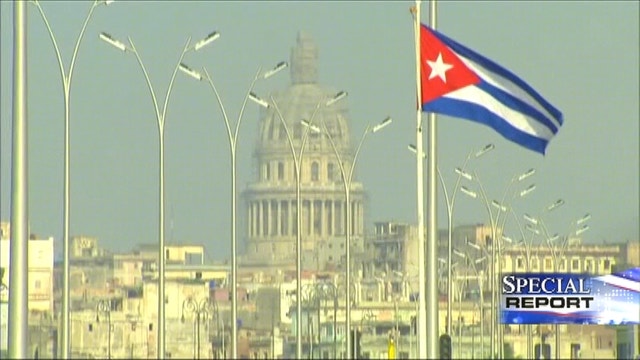Cubans entering U.S. at record pace
Enticed by taxpayer-provided welfare and the hope of a better life, Cubans are entering the U.S. at a record pace, fearing America's open door policy with the Communist nation may come to end with a new administration next year.
Enticed by taxpayer-provided welfare and the hope of a better life, Cubans are entering the U.S. at a record pace, fearing America's open door policy with the Communist nation may come to end with a new administration next year.
Unlike other Hispanics arriving from Mexico or Central America, Cubans arriving at the U.S. border receive preferential status. Mexicans caught by the Border Patrol are immediately deported. Central Americans, Haitians and others get a court hearing, and typically are sent home in a matter of weeks. But Cubans escaping poverty in their country are treated as political refugees, and under the 1966 Cuban Adjustment Act they automatically receive asylum protection — even if they are not leaving for political reasons.
"The current situation in Cuba is critical. Really bad," said recent arrival Carlos Zabala. "You can't live there. That is why you see a great migration of Cubans, because you can't establish a life there."
Zabala recently left Havana for Laredo, Texas, the new Ellis Island for Cubans. Rather than risk their life crossing the Florida Straits and get turned away by the U.S. Coast Guard, some 30,000 Cubans crossed into the U.S. from Mexico last year.
"Cuba has already sent us 2 million people. How many more will the U.S. allow?" asked Professor Jaime Suchlicki, Director of the Institute for Cuban and Cuban-American Studies at the University of Miami.
- California wine makers target rum-crazy Cuba as new export frontier
- Cuba, an internet laggard, launches broadband service in two neighborhoods
- Report shows that Cuban migrants becoming more violent with Coast Guard
- Second wave of Cuban migrants stranded in Costa Rica to be airlifted to El Salvador
- MLB stars take over Cuba
- Cuba releases street artist ‘El Sexto’ after 10 months in prison
- Divided families the legacy of surge in Cuban immigration to U.S.
- Pictures of a thriving new Cuban tradition: ‘quinceañera’ parties
"Right now you can walk into Laredo or El Paso, you say you are Cuban and they let you in," he added.
Unlike other immigrants, Cubans simply enter a U.S. port of entry and declare their nationality. Under the 1966 law, they are given medical care, food stamps and register for eight months of cash payments, along with an I-94 immigration form confirming their legal status. At 12 months, they are allowed to apply for permanent residency, a privilege no other illegal immigrants enjoy.
"Every Cuban worries the law will change. That's why a lot of Cubans try to come before that," says Alejandro Ruiz, founder of Cubanos en Libertad in Laredo. "They're detained in immigration for a few hours and then they're released from there with the I-94," he said. "Last night people go to South Carolina, one go to Austin Texas, others to Amarillo, but the most people go to Florida, Miami or different cities in Florida."
Ruiz runs a storefront just a few feet from the bridge immigrants cross as they enter the U.S. from Mexico. Most of the men arrive with a satchel across their chest, in a sweatshirt and cap. Ruiz helps arrange transport and welcomes the men with a friendly face and advice on staying out of trouble.
"Everybody worries because travel through Mexico is very dangerous," Ruiz said. "Sometimes they need to pay a smuggler, but sometimes they don't — using their phone and help from others who came before them."
Most Cubans fly to Ecuador, then take a train or bus to Colombia, through Central America to the Mexican border at Tapachula. Mexico gives the Cubans 90 days to make it to the U.S. Increasingly, the Cubans communicate with their GPS-aided smartphones, telling those in front and behind them by text where to stay, what to avoid and how to get from one point to the next.
"No coyote," said Zabala. "I made it via cell phone and Internet. People guided me through Guatemala to Mexico. I was assaulted in Colombia. Some thugs from Medellin struck me in the head with a gun. I had to give up my money to stay alive. But I am here now."
Many Cubans are hard working but critics argue they're no different than other immigrants wanting a shot at the American dream. Plus there is evidence, with increased charter flights between Florida and Cuba, that some are taking advantage of American generosity. According to a Florida Sun Sentinel newspaper investigation, 9 out of 10 foreigners in Florida getting refugee assistance are Cuban. The cost of their aid – food stamps, disability, cash assistance – approaches $700 million.
"We don't think the U.S. should be fleeced by people who claim to be refugees, then take advantage of our welfare system," said Cuban-American Congressman Carlos Curbelo (R-Fla.) "There are many abuses with the Cuban Adjustment Act and those need to be addressed."
Curbelo, the son of Cuban immigrants, took the politically sensitive step of saying the act needed reform. Popular in the Cuban-American community, Curbelo supports amending the law to require immigrants to prove political persecution. This would level the playing field with other immigrants from other nations, he says.
"A lot of Cubans supposedly flee persecution, qualify for economic assistance, then return to Cuba. Some even live in Cuba. We can't stand by while they abuse American generosity," he said.
Curbelo is co-sponsoring a bill to amend the law, but no one expects it to change until after the November election.













































